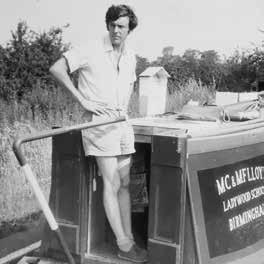
18 minute read
HOUSIAN ANNOUNCEMENTS
ENGAGEMENTS
HATTY COMYN (2005-2008)
Advertisement
became engaged in Autumn 2019, postponed her wedding planned for July 2020 due to covid restrictions, and is getting married to fiance Sam Gummer on 24th July 2021.
BIRTHS
Rory Darbishire, son of AMBER (née TILLEARD, 1994-2003) and Ed, was born on 27th March 2020 weighing 8lbs 10. He was christened on 20th September and Housian Annabel Richmond-Watson, Amber’s best friend from WHS, is a godmother. Christopher Attanasio, son of JEMIMA ATTANASIO (née CHEATLE) and Tom, was born on 25 February 2020, weighing 7lbs 4oz. A brother for Matthew (7) and Jack (9).
DEATHS
DAVID BAIRD (1944-49)
HUGH BUCKLE (1949-54)
6 May 2018 JULIAN CRAWFURD (1951-57) 9 March 2020
ROBIN GRANT CHAVASSE (1938-
43) passed away peacefully. 31 March 2020
MICHAEL LLOYD (1953-57)
2 April 2020. See obituary by wife Merryn Wilson on page 46.
DONALD SIMPSON, former Assistant Head and Mathematics Teacher at WHS from 1962 to 1995. 10 May 2020. See obituary on page 41.
PETER WARNER, husband of Sally, and father of Housians Sam, Toby, Catherine and Isobel, after a brief and intense fight against illness. He was a kind, generous, intelligent and funny man. 22 June 2020
MARK BARRACLOUGH (1943-48)
September 2019
MICHAEL SPRAGG (1941-46)
1st January 2020
REV JOHN HORACE BRAZEL COTTON (1940-42)
3 January 2021, aged 92 His wife Margaret wrote, “I have very happy memories of the times we visited our sons at W.H.S.”
Below: Peter Warner and his family.
Donald Simpson
Assistant Head & School Bursar (1962-1995)
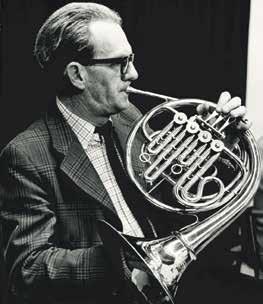
It was with sadness that we announced the death of Donald Simpson on 10th May 2020. Donald joined WHS in 1962 as a Maths teacher from Queensland, Australia, where he had attended Townsville High School and graduated from Queensland Teachers’ College and already been a Headmaster. Donald was appointed Assistant Head with Richard Speight in 1972, when Michael Llewellyn was preparing to step down as Headmaster, and latterly became School Bursar. He retired from WHS in 1995, returning to Magnetic Island off Townsville.
During his time at WHS, Donald spearheaded the introduction of ‘The New Mathematics’, bringing teaching of Maths more in line with what was perceived to be the expectations of industry and the wider world, was an early adopter of computers setting up the Computer Room and had a love of music. He played the horn and taught himself all other instruments so that the children could access their instrument of choice. He ran the Chapel Choir, conducted the School Orchestra and put on numerous Gilbert and Sullivan productions as well as other plays. He was heavily involved in the Cubs and Scouts and led both canal boat and camping expeditions.
Arriving at WHS at a similar time to David Jones (1955), Richard Speight (1961) and Richard Murdin (1965), Martin Roberts writes in his book ‘The House on the Hill’, ‘These men provided fresh legs on the games field and in their different ways were to work tirelessly on all those activities which make a preparatory school much more than a means of passing Common Entrance’.
Eulogy for Donald Alan Simpson written by Donald’s nephews Peter and Michael for his funeral, with additional input by their brother Neil Part A by Peter Abraham
My uncle, Donald Alan Simpson, the only sibling of our mother Shirley, was born in Townsville on the 17th September 1929 at a “Queenslander-style” home, built by his father. The house was at 66 Ross River Road, opposite the Mundingburra State Primary School which Don later attended. In recent years his birthplace home was briefly a yoga studio and coffee shop, and Don was happy to tell the operators that he was born in the actual room that we were served coffee. Imagine their surprise! Don’s father, our Pa, Gordon, was a cabinet-maker and had earlier been a trainee Presbyterian Minister in Hughenden where he met Don’s mother Jessie, a trainee nurse.
When Don was 9, he was already displaying superior mathematical skills, something he later went on to teach, and then he discovered music when he joined a fife and drum band after a new music teacher arrived at Mundingburra school. The fife was followed by the tuba in the school’s brass band, starting a lifelong love of brass instruments. He later found that he could play
almost any of the brass, one time offering to teach a student French horn, even though he had to buy a book and learn how to play it himself first! This love of music was to continue throughout his whole life, with Don participating in many orchestras, as well as later conducting orchestras as part of his extra-curricular school activities.
WW2 interrupted Don’s schooling and in 1942 Gordon, Jessie, Don and our mum, Shirley, evacuated to Inglewood, west of Brisbane. Don then went to Warwick to stay with his grandmother for a period, while his mum and sister returned to Townsville when it was safe to do so. When Don returned to Townsville in 1943, he passed his scholarship exam which enabled him to attend the state high school in Wills Street, the City. He was awarded a much-needed bursary to be a Teacher Trainee, allowing his family to keep him at school for his senior years.
At the age of 17, Don left Townsville and travelled to Brisbane to start his studies to be a qualified teacher with the Education Department. This was to be the career to which he devoted his life. He was in Brisbane when the Atomic Bomb brought an end to WW2 in 1945.
By this time, Don had discovered that his talent for music also extended to singing, so he joined a Brisbane Choir that performed with the Queensland Symphony Orchestra. He was then encouraged to be a bass singer with St John’s Anglican Cathedral and with a Roman Catholic choir both of which delivered a small wage. Don produced plays and acted for the Amateur Dramatic Society which he established, and joined the college Debating Society which held debates at Brisbane Parliament House.
After a time in the army reserve, Don said that the highlight of his brief military career was when he was on Picket Duty and arrested the unpopular company Sergeant Major, who had taken an Army Jeep and returned, in Don’s words, “drunk as a lord”. Don, formerly a Presbyterian, joined and was confirmed in the Anglican Church after being impressed with the “beauty” of the Anglican Church, the colourful dress standards of priests, the pomp and ceremony, and their style of worship. It was an appealing change from the strict Scottish Presbyterianism of his youth.
Upon the completion of his teaching studies, Don was offered and accepted a teaching role at Ascot State School, and in January 1950 Don was allocated a class of 73 Prep 3 children. Not enough classrooms were available and he was made to teach this huge class of children underneath a building between a toilet block and swimming pool. The noise from the pool made it impossible to teach and when a transfer was offered to a one teacher school at Jarail Creek near Kingaroy, he jumped at the opportunity.
The Anglican Bush Brotherhood visited that area regularly, and they offered Don the opportunity to teach Junior Physics and other subjects at All Soul’s boarding school in Charters Towers. He quickly became involved in running a large Scout Troop, with about 80 boys, with assistance from another teacher. After a year of deliberating, Don joined the Bush Brotherhood, but sadly without the support of his Presbyterian parents.
A dairy farm at Ravenshoe had been donated to the Bush Brotherhood, so Don and two others travelled there to see what use the 125-acre farm could be to them. A plan was made to build St Barnabas’ School on the site and Don and another 23 year old teacher were sent there to ‘found’ the school, with the help of an ex-student of All-Souls school who was also a qualified builder. This school is closed now and sadly all the records of this time are lost, perhaps discarded down a tin mine.
It was here that Don added even more diverse achievements to his career – this time it was farming!
The school farm flourished in Don’s hands and the farm became a regular contributor to the Ravenswood and Tablelands community. A huge number of animals were added to the farm over time, as well as tractors and other vehicles. Don learnt farrier skills and rode horses at the local show. By necessity, he learned Veterinary skills when faced with a number of different issues surrounding the large assortment of farm animals, as well as learning the art of bee-keeping.
During this time, Don studied to become a qualified Scout leader, something that was to be a very important part of his life, and when a local scout camp was built on Magnetic Island, Don arranged for his annual scout camp to be held there.
Deciding that he needed to pursue adventure abroad, Don left Sydney aged 32 on a near-empty migrant boat on New Year’s Eve 1961, travelling to England after encouragement from the incoming headmaster at Ravenshoe. The ship sailed via the Suez Canal and Cairo, and Don visited the Pyramids as well as many other places en route to England.
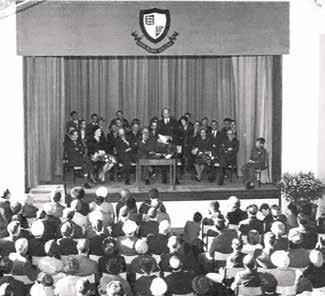
After a less than satisfying period of time spent as a supply teacher in some areas where teachers seemed to be fighting a losing battle, he applied to be a teacher at Winchester House School, a private boys’ school in Brackley, and was offered a very-welcome position. This school, that has associations to Runnymede and the Magna Carta, became his home for many years. During this time, he developed the music component of the school to a high level, including annual Gilbert and Sullivan productions which were loved by the boys.
Don later commenced joint headmaster duties at the school and had a huge array of tasks under his portfolio. As you would expect, Don threw himself into the job whole-heartedly. He developed inter-school athletics and one of his students went on to be a finalist in the 1976 Montreal Olympics. He also established a strong scouting movement at the school, with many scout camps and activities, including 21 years of canal expeditions throughout England during school holidays. He filled in at the school chapel when priests were in short supply, becoming a Diocesan reader and conducting services, except for the blessing.
When not using his holidays for canal boating, Don took the opportunity to travel when he could and visited places like the Norwegian Fiords, a North Cape Eskimo village, Rhine cruises from Amsterdam to Switzerland and the Scottish highlands, as well as returning to Australia to see family every three years.
The opening of the School Hall in 1969.
Part B by Michael Abraham
When I first heard that Uncle Don was coming back to live in Australia, I can remember my mother was so excited to have her only sibling and brother coming home, she was beside herself, and to be honest I was not sure what to expect. Don, the pommy Headmaster, coming home to bring some discipline and
punishment to us boys, was the image I had conjured in my mind. Don had come to stay with us in Australia every five years and had always been the no nonsense straight-talking man and just his presence commanded respect. But the truth is, Don was a gentle natured person like his sister and he quickly became my go to person for advice, or to help me figure some of life's problems out.
When he retired and returned to Australia, I remember catching the ferry to the Island with Don, to look at a couple of houses that he had found for sale. When he first saw the house in Granite Street his face lit up and he decided straight away that this was going to be his home. It was the quickest house purchase I had ever been involved with and within a week he was settling in and making this house his home.
I remember suggesting to Don that he might need to investigate air-conditioning, which he quickly dismissed and said it was never going to happen. The air conditioning decision reversal came quickly as the North Queensland summer set in and Don found himself dripping wet in sweat at 8.00am in the morning. Once installed, they ran 24/7 to keep his little haven at a perfect 24 degrees all year round. Don said that he had left his computer skills in England and would never ever touch one again. Yet a couple of years later he was learning languages online, creating his own website and has been printing his own books on plants he found on the Island, 19 of which can be found in the Townsville City Libraries.
Don loved exploring and would take hikes like the one into Balding Bay, or over the hill to Horseshoe Bay regularly, and I was always impressed on how fit he was considering he was 30 years older than me. He would also take his camera, capturing many landscape images as well as his beloved plants. For many years, he swam every morning at Picnic Bay. Some mornings he would have to break the ice to get in, but he never broke with his routine regardless of the weather conditions.
After Don moved back to Australia, I found him to be so much like his father who I spent my first 20 years growing up with and was always the gentleman. He had no time for gossip, had a strong opinion on everything and did not tolerate fools at all. He was one of the smartest men I have ever met and what I really enjoyed about him, was he would always tell it like it was and sometimes not always what you really wanted to hear. It’s amazing to think that this man lived
A School performance of 'Pirates of Penzance', 1969.
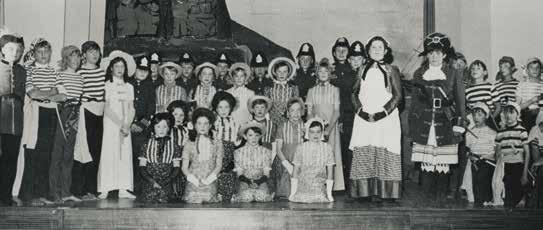
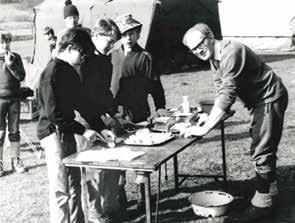
One of many school expeditions, 1980s.
through a world at war and the great depression and so many other hard times and then find out that his own funeral would be affected by a world-wide pandemic that would restrict how many people would be able to see him off. Rest in peace Don, you have lived a full and amazing and inspirational life, full of years.
Condolences from the wider WHS community
Christopher Wilson (1984-90) ‘Donald was one of those individuals who encapsulated, in his own unique way, all that was very special about Prep Schools during those years. It is hard to find such people in schools these days, and in my opinion we are that much poorer for it.’
Patricia Baxter, former Catering Officer (1965-68)
‘My memories of Donald are how wonderful he was when he formed the ten year olds into a choir of trebles. I enjoyed listening to them during Sunday morning service. The Gilbert and Sullivan performances were great fun and I enjoyed planning party food for the ‘last night’. For Pirates of Penzance we made a galleon out of sponge cake with smarties for portholes and was helped by Jason one of the young masters in setting up the rigging and sails and the skull and cross bones pirates flag. Alice in Wonderland had a Cheshire cat cake and lots of hearts. They were wonderful occasions at the end of each Michaelmas term, which were enjoyed by all the school and staff. Donald’s organisation was second to none, with a hired full orchestra, costumes made by the staff, singing and production.’
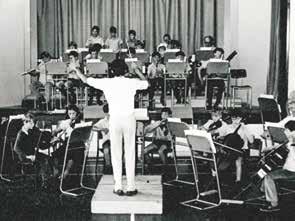
The School orchestra, 1970s.
Jeremy Dixon (1979-1984)
‘Donald, or Daz as he was known on account of his initials being DAS, was my Maths teacher throughout my time at WHS as well as sometime housemaster, orchestra conductor and Gilbert & Sullivan impresario. He was quite pleased that he had two choristers during my time there, me and Jonathan Danger, that looked sufficiently similar that he could finally put on the Gondoliers as the two leads are twins. Occasionally short of temper (he once gave me an almighty rollicking in front of the whole dining room when I told him I’d just dropped and broken the school oboe), but then who wasn’t at times? He introduced many of us to computers when very few schools had them and my Mathematical ability as a banker owes much to Daz and the dreaded triple Maths on Thursday mornings, where our exam technique was honed through test paper after test paper. A great servant to WHS, I remember him with much fondness.’
Simon Ward (1970-74)
‘I seem to recall he made his own, rare instrument - called a serpent I believe. Google images will show you what one looks like! I think it was required for a particular musical part in one of his Gilbert and Sullivan plays, possibly The Mikado. This would be in the early 1970's.’
Doug Reid (1973-79)
‘I was at WHS from 1973 and was taught the French horn by Donald, was in the chapel choir and school orchestra. I also took part in a couple of his Gilbert & Sullivan productions which were always one of the highlights of the school year. Donald was a bit of a Marmite character I remember. If you were musical or a mathematician he was relatively easy to get on with but could be a bit fiery! I certainly had a lot of respect for him.
‘He was the housemaster for the Upper Lodge, in charge of the boarders and lived in the upper lodge. He had a large reel to reel tape recorder and an impressive sound system and would invite groups of boys to listen to music on the odd Saturday evening.’
Keith Steel (1977-1982)
‘He was one of those masters whose devotion to the school, its values and its pupils was of a remarkable order, which one looks back upon and recollects with the warmest admiration and respect. His example of professionalism, commitment and giving of self, I am sure, will have inculcated and instilled in many an old boy/girl the foundations of much that is good in life. It is pleasing to know that after so many years of self-sacrifice he was granted so many years of pleasant retirement in his native Australia.’ H
Michael Christopher Lloyd (1953–1957)
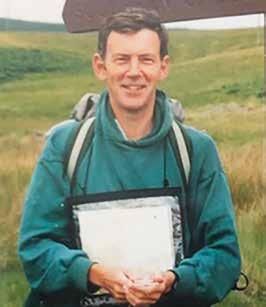
Written by Michael's wife, Merryn
Michael came to Winchester House School just before his 9th birthday. His younger brother, Peter, who overlapped him by one term, remembers that he was in the choir and had a very good treble voice, winning a prize; one year he sang the solo verse of Once In Royal David’s City at the start of the carol service. He was a scout and acted in various school plays. A friend, Andy Falk, claims to have been on the stage with him in Twelfth Night, when he and Mark Dancy (son of John Dancy, former Marlborough College Master) were pages while Mike played Orsino. Mike had a distinguished career, winning a scholarship to Marlborough College and then later winning two scholarships to New College Oxford: a county scholarship and a New College scholarship in classics.
His deep convictions and sense of vocation (he at one time contemplated taking orders, and remained
closely connected to his local church) attracted Mike to the idea of demanding public service. After Oxford, he seriously considered the prison service, before following his lifelong calling as a schoolteacher in deprived inner city areas.
In 1969 Mike married Merryn Geddes, and it was an ideal partnership for over fifty years. Although he retained a lifelong love of and involvement with classics, he made his mark as an English teacher, first in the East End of London, and subsequently in Birmingham. He was an inspirational teacher who communicated a passion for Shakespeare and other writers, and embedded it by involving pupils in dramatic productions. He and Merryn broadened the horizons of his pupils - many of them from challenging backgrounds - in other ways, through canal trips on their narrow boats, walking, sailing and canoeing. For nine years Mike organised a school exchange with Uppingham School, where his father had been Headmaster from 1944-65.
Driven by his commitment to equality of opportunity for pupils of all abilities, and believing that English was far better assessed in terms of students’ development over time, Mike was the prime mover in trying to re-establish a higher balance of coursework in English GCSE examinations in the 1990s (‘Save English Coursework’). This was in the days before email, let alone social media, and involved much hard graft with pen and typewriter. He won wide support for his brave campaign from colleagues across the country.
Mike was a loving family man, with a tremendous feel for language and a gift for parody and pastiche. His engagement with his local community and beyond was committed and wide-ranging: from churchwarden to trusteeships of local charities and governor of Elmhurst Ballet School; from playing the bassoon and singing in choirs to strenuous hillwalking and, in retirement, adventures in cookery. Tragically, the onset of Parkinson's Disease curtailed these, but he remained determinedly as active as he could be, his enjoyment of their two children, three grandchildren and poetry undiminished. He died on 2 April 2020 as a result of Covid-19. His family looks forward to celebrating Mike’s life at a thanksgiving service when restrictions are lifted, grateful for a rich life well lived. H
Michael on a canal boat during his time in Birmingham. Inspring his pupils.
